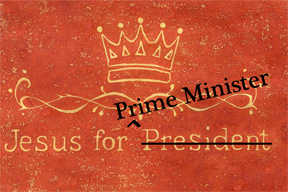by Brian Walsh
 Political discourse is almost never humble and gracious. It is seldom honest. And very, very rarely does it take the tone of lament.
Political discourse is almost never humble and gracious. It is seldom honest. And very, very rarely does it take the tone of lament.
Indeed, it sometimes seems that politicians have a very limited emotional range when they speak. They seem to only know the tone of self-congratulation (the discourse of those in power) or anger (the discourse of those who want power).
Stephen Harper speaks with the language of self-congratulation – we can expect such language to dominate his speeches throughout the campaign. The opposition, on the other hand, speaks out of anger.
Don’t get me wrong, sometimes anger is a perfectly appropriate emotional tone (although self-congratulation is almost always unbecoming). But Michael Ignatieff’s tone while moving a motion of non-confidence in the House of Commons was all angry. It should have expressed a profound sadness. Like a bad preacher, he essentially yelled at the government when he should have found himself in a posture of lament.
Allow me to offer something of what I think he should have said:
Mr. Speaker, I rise in the House today with a heavy heart. It is a serious thing to make a motion of non-confidence in the government of Canada. And it is an even more serious thing when one does so not in order to defeat a particular government bill or budget, but on the basis of contempt.
Mr. Speaker, you ruled that the government breached the privilege of the House when it refused to openly and honestly disclose the real costs of its law and order legislation, its corporate tax cuts, and it plans to buy F-35 fighter jets. That ruling led the Procedure and House Affairs Committee to consider whether the government’s breach of privilege constituted nothing less than contempt of the House.
As you know, Mr. Speaker, that committee of this House has indeed found the government in contempt.
This is nothing to boast of on either side of this chamber. This is nothing that members of my party, or I dare say, the other opposition parties, take any perverse pleasure in.
This is a moment of national embarrassment and disgrace.
This is a historic event not only in the history of our great country, but in the history of the Commonwealth. Never before has a parliamentary government rooted in the traditions of Westminster been found in contempt.
This House, therefore, has no choice but to pass a vote of non-confidence in this government. And so with sadness, based upon both your own rulings and the findings of a committee of this House, I make this motion of non-confidence in the government.
It may well be that the people of Canada have little desire for an election this Spring. It may even be that the people of Canada will punish the opposition parties for forcing such an election. But a Parliament cannot function when the government holds it in contempt. A democracy cannot flourish when the ruling party deceives the House about the real costs of its policies.
Democracy, Mr. Speaker, can only thrive where there is honesty and mutual respect for all citizens and all of their duly elected representatives. We must pass this motion of non-confidence for the sake of democracy, for the sake of our constitution, and for the sake of our country.
Perhaps this might have better conveyed the weightiness of the motion. Maybe we need to replace self-congratulatory and angry politics with a politics of lament.
In the end, only lament can give birth to hope.
4 Responses to “What Michael Ignatieff Should Have Said”
Scott McLeod
Thanks for your words Brian. I too wish that something like that had been said. I have hope, that in the midst of it all, that kind of lament will be heard and responded to, and then real change will happen.
greg paul
Brian Walsh for Prime Minister.
andrew
Hear Here!
Brian Walsh
A speech writer, maybe, but definitely not Prime Minister.
Brian Walsh